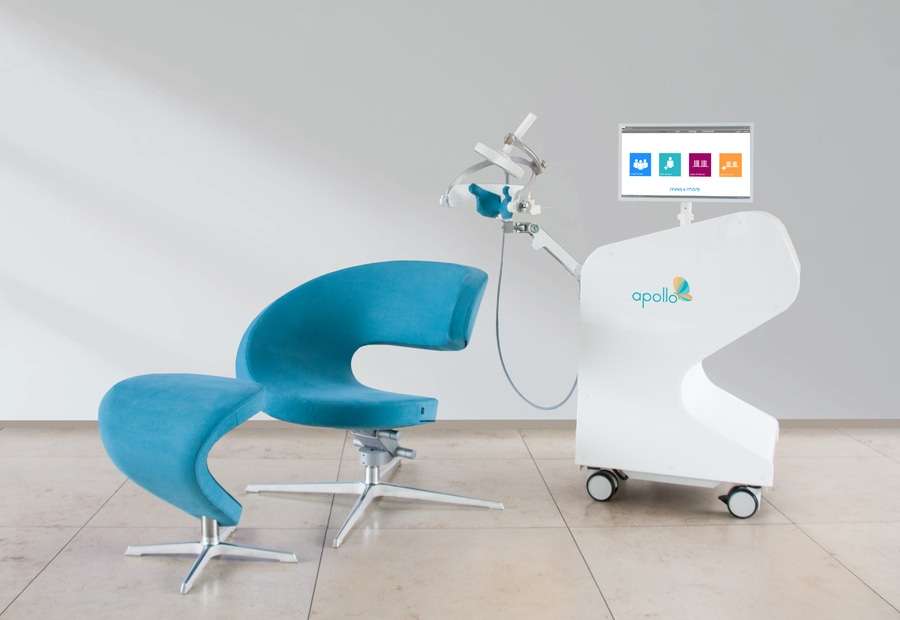TMS Therapy for Anxiety: Insights and Options at American TMS Clinics, Scottsdale AZ
Insights and Options at American TMS Clinics, Scottsdale AZ
Anxiety can be very bad and affect all parts of your life. We understand how hard it is for people with anxiety here at American TMS Clinics in Scottsdale, AZ. So, we're committed to looking into new treatments like TMS therapy for anxiety that can give people who are looking for relief new hope.

Understanding TMS Therapy
Magnetic fields are used in TMS therapy to stimulate nerve cells in the brain without hurting the person. TMS was first approved by the FDA to treat Major Depressive Disorder. It has since shown promise in other areas, such as helping people deal with anxiety. For the treatment, an electromagnetic coil is put on the head. This coil then sends short magnetic pulses to certain parts of the brain to stimulate them.
Ready For A TMS Consultation?
Advancing Research on TMS for Anxiety
- Transcranial Magnetic Stimulation (TMS) is being used to treat anxiety disorders, which is a new and growing area of scientific study. Researchers have already shown that TMS can help people with major depressive disorder, and now they are starting to look into whether it could also help people with anxiety.
- We are always learning more about how TMS can help with anxiety thanks to ongoing clinical trials and academic research. Not only do these studies look at how well and safely TMS works for anxiety, but they also try to find the best ways to treat it, like what frequency and intensity of magnetic stimulation work best for anxiety.
- Scientists are interested in TMS for anxiety because they need new ways to treat the condition, especially for people who don’t get better with standard treatments like therapy and medication. When TMS is used, magnetic fields are used to directly change brain activity, which is different from drug-based treatments.
- In 2013, a major study in the “Journal of Affective Disorders” laid the groundwork for future research in this area. Along with other new studies, this one looks into how TMS can change neural pathways and regions that are linked to anxiety. These research projects look into how TMS might help people with anxiety. For example, they look at how it might lower overactivity in parts of the brain that are known to be linked to anxiety disorders.
- Though more research needs to be done, these studies should help us understand how TMS can be used to treat anxiety better, which could lead to better and more useful therapeutic uses. More and more studies are being done in this area, which shows how important TMS is as a flexible neuropsychiatric treatment that might be able to help with more than just depression.

Off-Label Use Disclosure
We put patient safety first at American TMS Clinics and follow medical guidelines. It is important for our patients to know that using TMS for anxiety is not what the drug was made for. For now, this means that the FDA has not approved TMS as a specific way to treat anxiety. More research is needed to fully understand how well it works in this area.
BEGIN YOUR RECOVERY TODAY!
Step towards reclaiming your life with our support. Unveil the possibilities with our therapies in Scottsdale, AZ. Call to unfold your path to wellness.
Treatment Method and Accessibility
Sessions of TMS therapy last between 15 and 25 minutes and take place in a comfortable, outpatient setting. One of the best things about TMS is that it doesn’t hurt, so patients can go back to their normal lives right away after each session. Our Phoenix, AZ, clinic has the most up-to-date TMS technology, and our staff is trained to make the space supportive and caring.

Our Approach in Scottsdale
Our goal at American TMS Clinics is to provide personalised care. Different people deal with anxiety in different ways, so we make sure that our treatment plans fit the needs of each person. Every step of the way, our team is here to help and support you.
If you or someone you care about is dealing with anxiety and looking for different ways to treat it, TMS therapy might be a good option.
To set up a meeting, call American TMS Clinics in Scottsdale, AZ. Our skilled staff will help you figure out if TMS could be a good way to treat your condition, giving you all the information and support you need.
Note: This is just for your information and should not be used instead of professional medical advice.
Transcranial Magnetic Stimulation (TMS) is a non-invasive procedure that uses magnetic fields to stimulate nerve cells in the brain, primarily used to treat depression and other mental health conditions. It involves placing a magnetic coil near the scalp to deliver focused magnetic pulses to specific brain regions.
Yes, Transcranial Magnetic Stimulation (TMS) is FDA-approved for the treatment of Major Depressive Disorder. The FDA granted approval after reviewing extensive clinical trials and data demonstrating the safety and efficacy of TMS for this condition. Additionally, certain TMS devices have also received FDA clearance for treating Obsessive-Compulsive Disorder (OCD) and migraine. The approval for these conditions is a testament to the effectiveness of TMS as a non-invasive treatment option. However, it's important to note that the use of TMS for other conditions may still be considered off-label or experimental and should be discussed with a healthcare professional.
TMS is typically recommended for patients with major depressive disorder who have not responded to traditional antidepressants. Eligibility is determined based on medical history, the severity of the condition, and prior treatment responses.
Most patients do not find TMS therapy painful. Some may experience mild discomfort or a tapping sensation on the scalp during treatment, which often decreases over time.
Many insurance plans now recognize the effectiveness of TMS therapy and provide coverage for conditions like major depressive disorder. The extent of coverage can vary based on the specific insurance provider, the patient's individual plan, and the medical necessity as determined by a healthcare professional. It's important for patients to directly contact their insurance company or work with the TMS clinic's insurance specialists to understand their coverage, including deductibles, copays, and any specific requirements for pre-authorization.
Transcranial Magnetic Stimulation (TMS) is recognized for its safety, with minimal long-term side effects reported. Common side effects like scalp discomfort or headache are usually mild and occur during or shortly after treatment sessions. Long-term side effects are rare, making TMS a well-tolerated option for patients, especially when compared to other treatments like Electroconvulsive Therapy (ECT) or certain medications that can have more significant systemic or cognitive side effects. Ongoing research continues to affirm the safety of TMS, with studies indicating no significant adverse effects over extended follow-up periods.
The FDA's approval of TMS for treating major depressive disorder underscores its safety profile. This approval, based on rigorous clinical trials, reinforces TMS as a safe option with a low risk of long-term side effects. As with any medical treatment, patients should consult healthcare providers to understand the risks and benefits based on their individual health needs.
